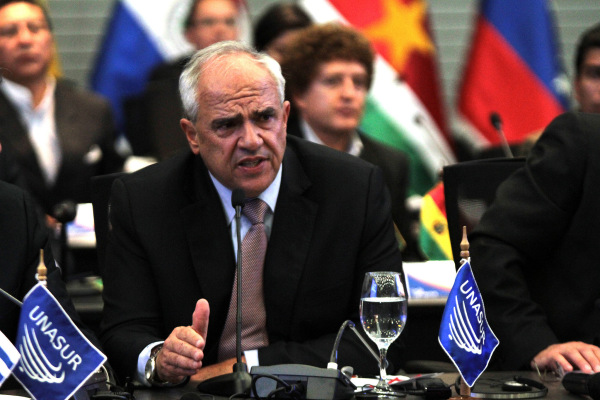Andrés Serbin and Andrei Serbin Pont – UNASUR and the Venezuelan Hot Potato
UNASUR and the Venezuelan Hot Potato
Published in AULA Blog : https://aulablog.net/2016/07/06/unasur-and-the-venezuelan-hot-potato/
By Andrés Serbin and Andrei Serbin Pont*
The Venezuelan crisis, which the hemisphere has turned to UNASUR to resolve, could break the South American organization and overshadow its past successes in regional mediation. UNASUR was created in 2008, amid the proliferation of regional organizations such as ALBA that excluded the United States and Canada, as an inter-governmental mechanism to promote regional autonomy, conflict prevention and resolution, and the coordination of public policies, particularly regarding social issues, security, infrastructure, and energy. It has been driven by individual presidents’ leadership and managed by high-ranking officials and, despite rhetoric to the contrary, has not shown deep commitment to greater civil society participation. Among its important successes have been defusing internal conflicts in Bolivia and Ecuador, as well helping reduce tensions between Ecuador and Colombia, and between Colombia and Venezuela. In years past, the group’s effectiveness raised questions about the OAS’s comparative ability to deal with regional conflicts.
In recent years, however, UNASUR has suffered decline. As the commodities boom ended, regional economies were hit hard, and internal political factors started to change the political map, undermining leftist governments and enabling the election of center-right governments less committed to the UNASUR vision. This coincided with the profound decline of Venezuela as it fell into the abyss of hyperinflation, debt, scarcity, criminality, and debilitating political instability. The Venezuelan opposition’s achievement of a parliamentary majority last December, after 17 years of Chavistahegemony, brought no relief as the government reacted with an all-out effort to block it. UNASUR, which first sought to foster a dialogue between the government and the opposition in 2013, has repeatedly failed to broker a solution. In May 2016 the organization turned to three former heads of state – Spanish Prime Minister José Luis Rodríguez Zapatero, Dominican Lionel Fernández, and Panamanian Martín Torrijos – to attempt mediation again, to no avail so far. The government continues to resist change, and the opposition, in addition to remaining firm in its demands of a recall vote to remove Maduro and the unconditional release of political prisoners, has shown persistent mistrust of UNASUR and its representatives, whom they perceive as allies of the government. Such suspicions may not be unfounded, considering Zapatero’s objections regarding the participation of some relevant opposition leaders in the dialogue process.
For the first time in its almost 10 years of existence, UNASUR faces potential failure in its attempt to solve a strategically important political crisis in the region. To hold off an initiative by OAS Secretary General Almagro to enforce the Inter-American Democratic Charter against Venezuela, the OAS Assembly called on UNASUR and the former presidents to renew mediation efforts yet again last month, but neither Maduro nor the opposition has budged from their fundamental positions. The situation is, again, stalled. Indeed, in the context of declarations, extraordinary sessions, initiatives and trips, the commitment to end the crisis in Venezuela still appears quite limited among OAS members, including UNASUR. Governments supporting dialogue seem most eager to avoid risking valuable political capital both in the domestic and the international spheres. Neither UNASUR nor the OAS is prepared to handle the Venezuelan hot potato, and both stand to lose credibility for this failure. But UNASUR’s general lack of leadership and direction in recent years suggests that failure in this crisis, with implications beyond Venezuela’s borders, would be potentially fatal to the organization. UNASUR, with previous achievements in social, political and regional matters, must now prove that it is still a viable regional mechanism, able to deal collectively with the political turbulence of a changing regional landscape.
July 6, 2016
* Andrés Serbin and Andrei Serbin Pont are members of the analysis team of the Coordinadora Regional de Investigaciones Económicas y Sociales (CRIES), a Latin-American think tank.

